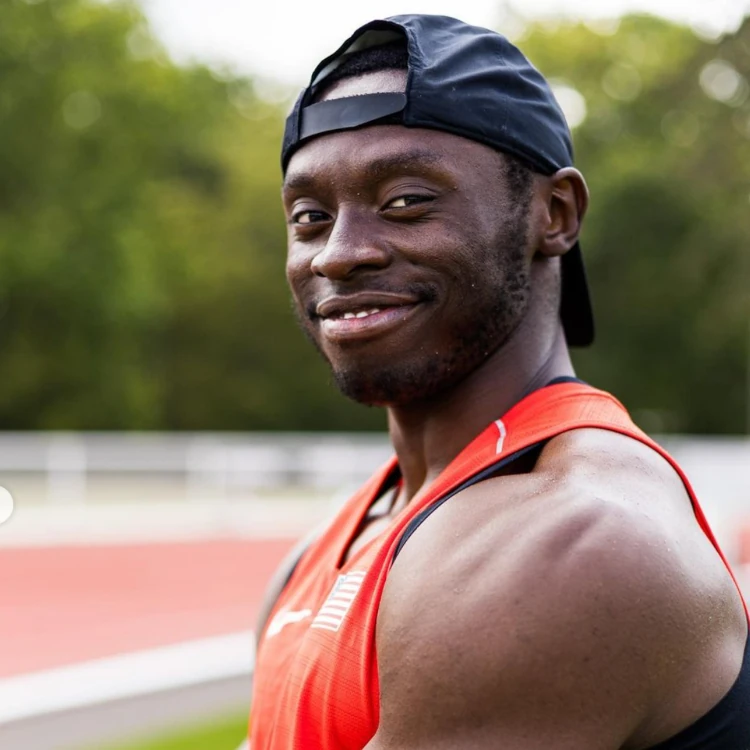by Emily Treacy

After his first two attempts in the long jump at last summer’s World Para Athletic Championships, Derek Loccident wasn’t having the experience he envisioned.
His first jump fell far short of his standards. His second attempt was disallowed because he overstepped the takeoff line. With four jumps remaining in the competition, Loccident stood on the blue track in Paris’s Chartley Stadium and took some deep breaths. “I felt like the moment was getting to me at that point,” he says.
The Worlds were Loccident’s first major international para athletics event, but he knew he belonged. He had prepared for this. He had earned his spot on Team USA. And he knew what was on the line: a chance to position himself for a spot in the 2024 Paralympic Games.
Loccident’s instinct told him to speed up, but his new training told him to slow down. Stay patient, he reminded himself. Stay patient.
Loccident had not been a patient person while growing up. He was a football player who liked to operate at full speed all the time. As a boy, he was so active that his mom signed him up for football as a way to get his energy out. He kept playing right through high school, making Oklahoma’s all-state team and getting recruited by the University of Central Oklahoma, one of the top programs in NCAA Division II.
But in the fall of 2019, two games into his sophomore season, Loccident lost the lower part of his left leg in an accident. For the first time in his life, he was forced to slow down. Before he could get back to running, he had to begin the slow process of learning to walk again.
“I expect things to happen right away and see it, because that’s what football is,” says Loccident. “You train and you practice, and you start seeing results afterwards, in the first week or two.”
But improvement doesn’t come overnight when you’re recovering from amputation. Loccident wanted to get back onto the football field and play on a prosthetic leg, which only a handful of NCAA players have ever done. But he knew it would take months of rehab and physical therapy to get his body back into shape.
“This wasn’t going to be easy,” Loccident says. “There were going to be hard days.”
He spent the entire 2020 season on the sidelines, but he attended every practice, supported his team, and put in the work. Being back around his team helped Loccident focus on his goal. It also helped him return to normalcy.
“I was struggling mentally,” he says. “Walking around campus I looked different, and I wasn’t accustomed to the stares and everything that comes with being an amputee. With [my teammates], it really didn’t matter. They didn’t look at me any different. And that was special to me, because I knew I could depend on those guys.”
Loccident eventually made it back to the active roster, appearing in nine games in 2021, his senior year of eligibility. After the season, a coach from Central Oklahoma reached out to Loccident and asked if he would be interested in running track.
Loccident had run for a few years in high school, but only to train for football. He had never competed at an elite level. But he was lucky to live in an area with strong parasports resources. Central Oklahoma University hosts the annual Endeavor Games, a major event that attracts lots of Paralympic hopefuls. The campus also serves as the training headquarters for Team USA’s sitting volleyball teams. And Loccident’s prosthetist, Oklahoma City-based Scott Sabolich, once served as Team USA’s official prosthetist.
In his first race, at the 2022 Endeavor Games, Loccident ran the 100 meter-dash in 13 seconds, an elite time in his T64 classification. This achievement struck a chord within him—“I could actually do this,” he says. He also found a new community of people he trusted and could depend on, like his football teammates.
“This was my first time being around something like that, and seeing everybody, all these different disabilities but everybody was just enjoying themselves. And everybody I worked with just had a smile and was just enjoying it, there’s a lot of lot of joy and happiness during that day.”
Training for track was similar to recovery from amputation—a lot of work and a slow buildup before you get the payoff.
This payoff took countless races and meets to achieve. Loccident started to realize his potential this spring. In early May he finished first in the long jump at the Oxy Invitational, with a distance of nearly 7.5 meters—a full meter over the second-place distance. Later that month, at the US Nationals, he finished second in a very strong field that included Paralympic medalists Jarryd Wallace and Trenten Merrill.
“Track is a process,” Loccident says. “It takes three years to train and prepare for the Games, and you’re trying to peak at the right moment. That’s something I had to learn along the way. You don’t want to peak [too soon]. You want to have your best performance during the big moment.”
All of those thoughts flooded through Loccident’s mind as he stood on the track in Paris, slowing down the moment as he prepared for his third jump. He took a few more breaths, remembered what he’d been training for, and kept his eye on one goal: to be a Paralympian.
Loccident nailed his third jump, flying 7.39 meters to move into second place. That distance held throughout the remaining three rounds of the competition. Only Markus Rehm, the legendary German who has dominated the T64 classification for more than a decade, had outjumped Loccident.
Rehm has held the world record for almost a decade. No athlete in his category has ever even made it close. Until now.
As Loccident left the podium, Rehm smiled, and said: “You’re next.”